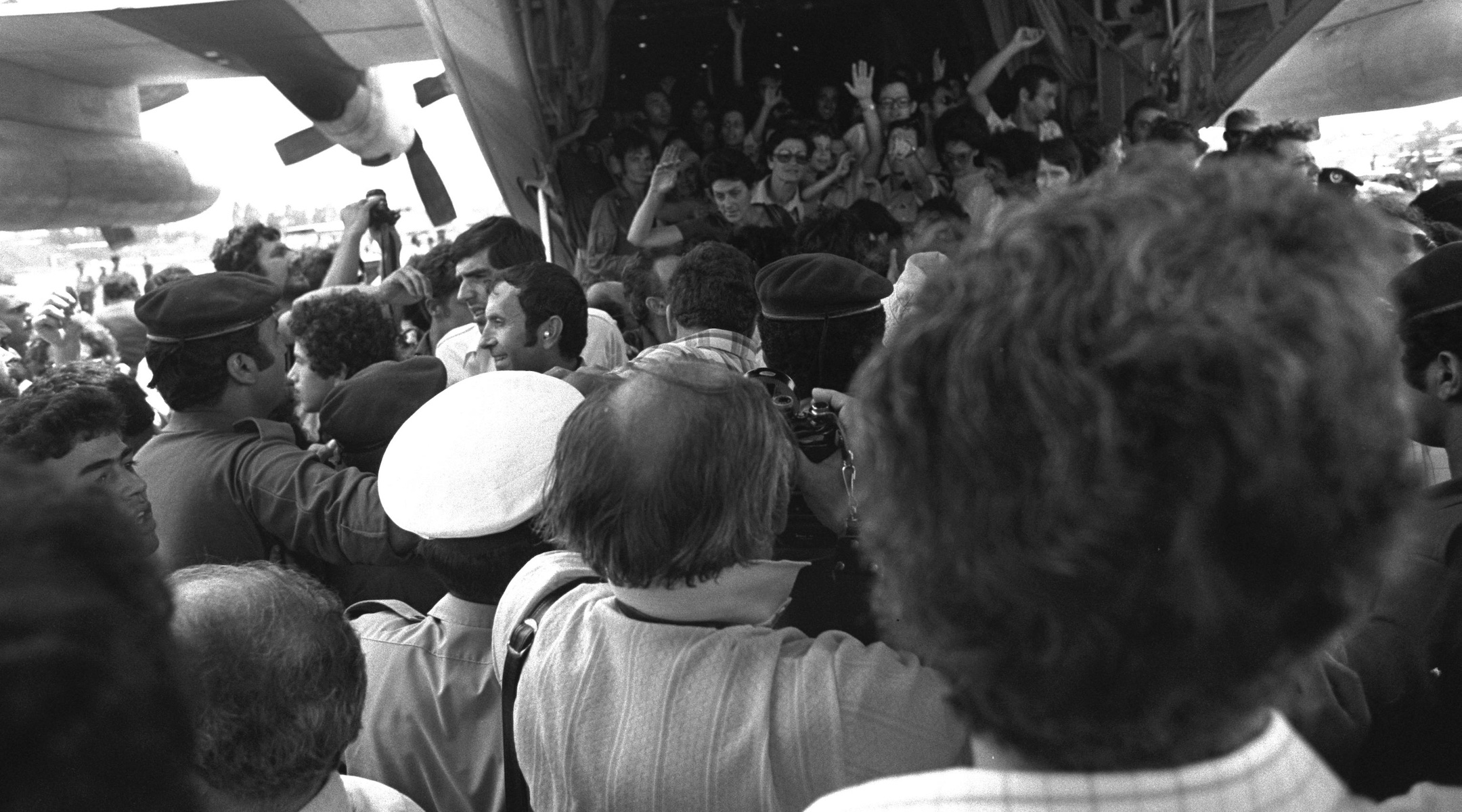As expected, on July 4, 1976, the United States celebrated its bicentennial with a flurry of patriotic pride and hype. The surprise was that the day also brought one of the most miraculous events in Jewish history: Israel’s rescue of 102 hostages being held over 2,500 miles away at an airport in Entebbe, Uganda.
A week earlier, on June 27, terrorists from the Popular Front for the Liberation of Palestine and a radical West German group hijacked an Air France airliner full of Israeli passengers and redirected it to the Entebbe Airport. The hijackers warned that if their demands – including the release of several dozen prisoners being being held in Israel and elsewhere – were not met, they would begin killing hostages. Israel dispatched multiple aircraft with 100 commandos for a rescue mission that astonished the world. Three hostages died during the rescue, and only one Israeli soldier was killed: mission leader Yoni Netanyahu.
Fast forward 48 years, and Yoni’s younger brother is now the prime minister, with Israel grappling with a longer-lasting and much more extensive hostage crisis. Not only were hundreds of people taken from Israel on Oct. 7, but this time the hostages were abducted from their homes and military bases on Israeli soil, in a broader attack that killed 1,200 people. With the exception of more than 100 hostages — mostly women and children — released through deals, most have spent nearly nine months in captivity, with little information known about their whereabouts or wellbeing.
The legacy of the raid on Entebbe is complicated: It endures as an inspiring embodiment of Israeli boldness and ingenuity – but one that set a near-impossible bar for success and has proven to be the exception to the rule in securing the release of hostages.
Multiple times since then, Israel has agreed to prisoner releases, and at a much worse exchange rate than the Entebbe hijackers were demanding. Back in 2011, Benjamin Netanyahu agreed to free 1,027 Palestinian prisoners in exchange for one soldier, Gilad Shalit, who spent five years in Hamas captivity in Gaza.
During the current war, Israel has staged three rescue missions, leading to the release of a combined seven hostages. However fleeting, the operations produced collective moments of relief and joy in Israel and among many Jewish communities around the world.
But far more of the captives came home after the deal struck on Nov. 22, 2023, when Israel and Hamas agreed to the release of hundreds of Palestinian prisoners during a cease-fire that was extended to a week. Almost all of the 109 hostages released by Hamas were freed by the end of November, during that truce. Israel has reportedly agreed in principle to release hundreds more Palestinians, including 100 serving life sentences for killing Israelis, as part of a wider multi-phased deal to get back what Israel says are 116 remaining hostages plus four whose captivity predates the war. More than 40 of those are thought to be dead.
Meanwhile a national debate has raged, with hostage families and their supporters waging a sustained protest movement to pressure the government to agree to a deal, even if it means accepting a ceasefire that falls short of dismantling Hamas. Former Israeli war cabinet minister Benny Gantz seemed to endorse this view after pulling out of the government a few weeks ago, which was followed with several reports of military officials increasingly making the case that securing a deal to free the hostages should now take precedence.
At this point, no one is talking about an Entebbe-style operation to save the bulk of the remaining hostages, who are thought to be held in separate locations across Gaza. What’s often lost in the nostalgic euphoria and mystique that still surrounds the historic rescue mission is just how close it came to never happening — because Israel was prepared, if need be, to end the crisis by bowing to the hijackers’ demand for a prisoner release.
In his 2010 memoir “The Prime Ministers,” Yehuda Avner — an adviser and speechwriter for multiple Israeli leaders — provided a behind-the-scenes account of the crisis.
Then, as now, families of the hostages were demanding the government make a deal. Similarly, there were those opposed to any concessions, arguing that it would reward terrorism and incentivize future hostage-taking. According to Avner’s account, the debate was playing out at the highest levels of the government, between Prime Minister Yitzhak Rabin and his political rival, Defense Minister Shimon Peres.
The twist: It was Rabin, an architect of Israel’s daring military strategy almost a decade earlier in 1967, who argued in a top-level closed-door discussion early in the crisis that a deal might be the only option. Peres, later to emerge as Israel’s most prominent dove and champion for compromise with the Palestinians, “delivered an impassioned address on the implications of capitulation to terrorist blackmail,” Avner wrote.
Rabin pressed the IDF chief of staff, Mordechai “Motta” Gur, asking if Israel had a viable military option for saving the hostages. Working on it, but not yet, was the gist of the general’s reply.
The prime minister adjourned the meeting, but only after raising the possibility of negotiating with the terrorists. What the others in the room didn’t know is that Rabin had previously determined what he would do in such a situation. Later that night over a drink, Avner wrote, Rabin shared his thinking: “When it comes to negotiating with terrorists, I long ago made a decision of principle, well before I became prime minister, that if a situation were ever to arise when terrorists would be holding our people hostage on foreign soil and we were faced with an ultimatum either to free killers in our custody or let our own people be killed, I would, in the absence of a military option, give in to the terrorists. I would free killers to save our people.”
The next day, with the terrorists threatening to begin executing hostages and still no military plan, Rabin informed a group of top ministers and advisers of his decision to move forward with negotiations. “If we are unable to rescue them by force we have no moral right to abandon them,” the prime minister said. “We must exchange them for terrorists held here in our jails in Israel. Our negotiations will be in earnest, not a tactical ruse to gain time. And we will keep our side of any deal we strike.”
Peres immediately objected, saying it would mark the first time Israel would “free prisoners who have murdered innocent civilians.”
“If we give in to the hijackers’ demand and release terrorists, everyone will understand us but no one will respect us,” Peres said. “If, on the other hand, we conduct a military operation to free the hostages, it is possible that no one will understand us, but everyone will respect us, depending of course on the outcome of the operation.”
Rabin shot back that without a plan, there was no choice. “You know as well as I do that the relatives of the hostages are stalking us day and night,” Rabin continued. “They are beside themselves with fear, clamoring for us to make an exchange, and for good reason.”
Peres relented and voted with the others on the ministerial committee in support of opening negotiations.
The next morning Rabin received the unanimous support of the full cabinet and then informed the Knesset Foreign Affairs Committee, which included opposition leader Menachem Begin.
Begin quickly caucused with several members of his party. “Who knows better than me what it means to take a stand on a matter of principle,” said Begin, who spent time in a Soviet gulag before immigrating to Palestine and then living for several years on the run from British authorities. “One of my principles is not to negotiate with terrorists. But when Jewish lives are at stake every principle must go by the board. We must rescue our brethren from execution.”
Next Begin, who just five years later as prime minister would order a surprise strike on Iraq’s nuclear reactor, let Rabin know that absent a credible military rescue plan he had the opposition’s support for negotiations.
Soon after Israel’s decision to enter negotiations, however, the IDF produced its plan, shifting the calculus for Rabin and the other political leaders in support of a military option – even with the risk of casualties, among both the hostages and the Israeli soldiers sent to rescue them.
“If we have a military option,” the prime minister said, “we have to take it, even if the price is heavy, rather than give in to the terrorists.”
In 2024, no comparable rescue plan appears to be on the table, but the contours of the debate are similar: Some believe that negotiating with terrorists is succumbing to blackmail and argue Israel must press for a decisive military victory over Hamas. Others insist that in the interest of saving Israeli lives, even once unthinkable deals must be on the table.
It was Peres, then president of Israel, who expressed the anguish of such choices when he signed off ceremonially on the deal that freed Shalit in 2011. “My decision in this matter to exercise my authority in no way pardons or forgives these murderers and criminals,” he said. “I do not forgive and forget. The sense of loss will never be erased. The heroism of the victims will not be forgotten.”
JTA has documented Jewish history in real-time for over a century. Keep our journalism strong by joining us in supporting independent, award-winning reporting.







